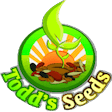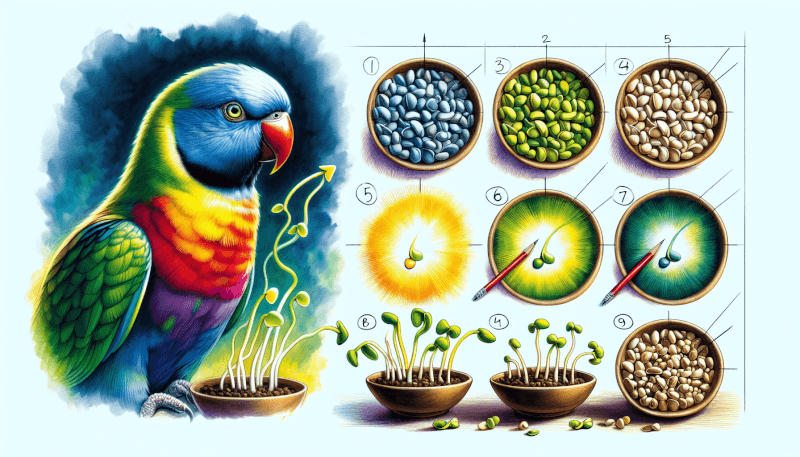Do you want to provide your parakeet with a healthy and nutritious diet? Look no further! The article “Sprouting Seeds For Parakeets” explores the benefits of sprouting seeds for these beloved birds. Sprouting seeds not only add variety to their diet but also offer a multitude of health benefits. From boosting their immune system to aiding digestion, sprouted seeds are a simple and cost-effective way to ensure your parakeet receives all the necessary nutrients. Join us as we uncover the wonders of sprouting seeds and learn how to incorporate this beneficial practice into your parakeet’s daily routine.
Health Benefits of Sprouted Seeds for Parakeets
If you’re looking to enhance your parakeet’s health and diet, sprouted seeds are an excellent addition to their daily meals. Sprouted seeds are known to offer numerous health benefits to parakeets, including increased nutrient content, improved digestibility, and a boosted immune system.
Increased Nutrient Content
One of the key advantages of sprouting seeds for parakeets is the increased nutrient content they provide. When seeds are sprouted, they undergo a natural process where their nutrients become more bioavailable and easier for your parakeet’s body to absorb. Sprouted seeds are rich in vitamins, minerals, and essential amino acids, making them a nutritious addition to your parakeet’s diet. By incorporating sprouted seeds into their meals, you can ensure that your feathered friend is getting all the essential nutrients they need to thrive.
Improved Digestibility
Another benefit of sprouted seeds is their improved digestibility. The process of sprouting activates enzymes in the seeds, which break down complex carbohydrates into simpler sugars that are easier for your parakeet’s digestive system to process. This means that your parakeet can extract more nutrition from the seeds, leading to better overall digestion and nutrient absorption. The improved digestibility of sprouted seeds can also help prevent digestive issues such as bloating or constipation in your parakeet.
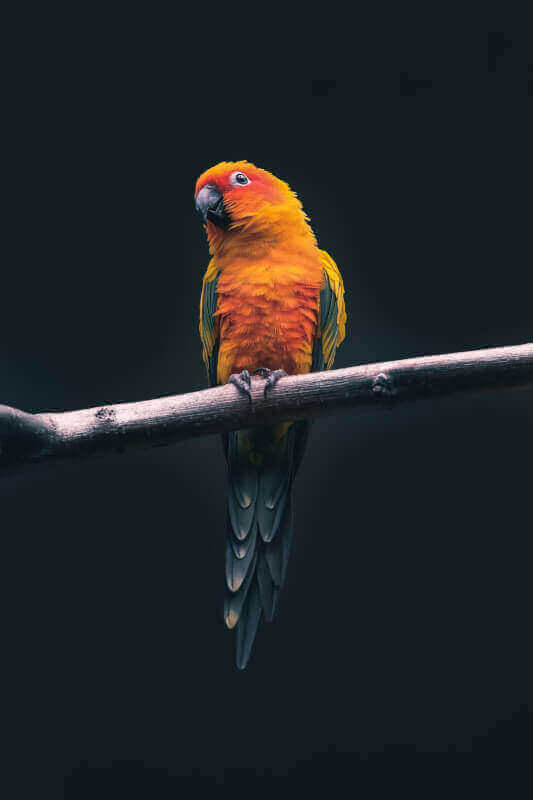
Boosted Immune System
Sprouted seeds can also contribute to a boosted immune system in your parakeet. During the sprouting process, the seeds undergo biochemical changes that result in increased antioxidant levels. Antioxidants are crucial for supporting a healthy immune system by neutralizing harmful free radicals in your parakeet’s body. By including sprouted seeds in their diet, you’re providing your parakeet with a natural way to strengthen their immune system and improve their overall well-being.
Choosing the Right Seeds for Sprouting
When it comes to sprouting seeds for your parakeet, selecting the right seeds is essential. There are several popular seed varieties that are suitable for sprouting, including broccoli, alfalfa, mung beans, and radish. These seeds are known for their high nutritional value and are readily available in pet stores or online.
In addition to the seed variety, there are other important factors to consider when choosing seeds for sprouting. It is essential to opt for organic, untreated seeds to ensure that no harmful chemicals or pesticides are present. Furthermore, you should also check the expiration date and ensure that the seeds are fresh to maximize their sprouting potential and nutritional benefits for your parakeet.
Preparing Seeds for Sprouting
Proper preparation of the seeds is crucial to ensure successful sprouting. Here are the steps you should follow to prepare the seeds:
Seed Selection and Inspection
Before sprouting, carefully inspect the seeds you have chosen. Discard any damaged or discolored seeds, as they may not sprout properly or could introduce contaminants to the sprouting process. It is also important to remove any foreign objects or debris mixed with the seeds.
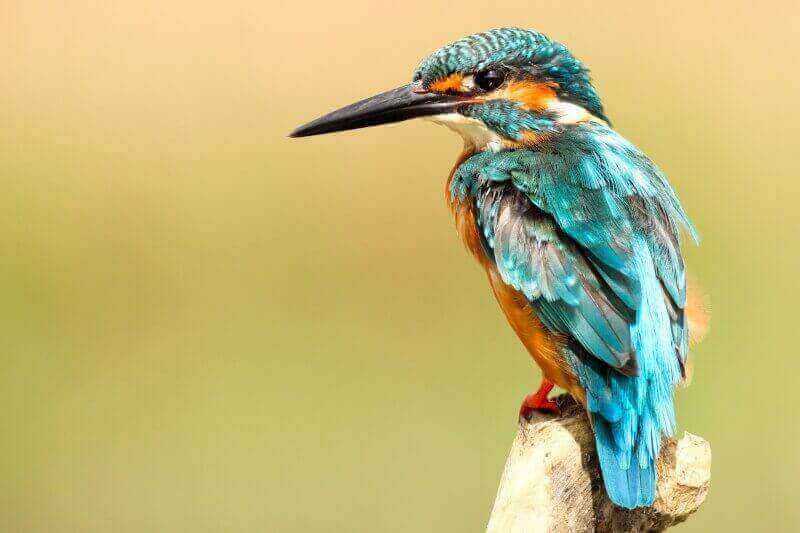
Pre-soaking the Seeds
Once you have selected the seeds, pre-soaking them is essential to initiate the sprouting process. Place the seeds in a clean container and cover them with filtered water. Let them soak for the recommended time, which typically ranges from 4 to 12 hours, depending on the seed variety. Pre-soaking helps to soften the seed coat and initiate the sprouting process.
Rinsing and Draining
After soaking, thoroughly rinse the seeds under clean running water. This step helps remove any remaining debris or impurities. Drain the excess water from the seeds and transfer them to a sprouting tray or jar for further sprouting.
Methods for Sprouting Seeds
There are different methods you can choose from when it comes to sprouting seeds for your parakeet. Two popular methods are sprouting in jars or containers and using a sprouting mat or tray.

Sprouting in Jars or Containers
To sprout seeds in jars or containers, start by adding the pre-soaked seeds to a clean jar or container. Cover the opening with a mesh or cheesecloth to allow for proper ventilation while preventing insects or debris from entering. Place the jar or container in an inclined position to allow for drainage and proper airflow. Rinse and drain the seeds twice a day, ensuring they remain moist but not waterlogged. Within a few days, you will see the sprouts emerging, indicating they are ready for harvest.
Using a Sprouting Mat or Tray
Alternatively, you can use a sprouting mat or tray, which provides a controlled environment and makes the sprouting process more convenient. Spread the pre-soaked seeds evenly on the tray or mat and ensure they are not overcrowded. Place the tray in a location with indirect light and maintain proper ventilation. Keep the seeds moist by lightly misting them with water several times a day. After a few days, you will witness the seeds sprouting, indicating they are ready for the next step.
Maintaining Optimal Sprouting Conditions
To ensure successful sprouting, it is crucial to maintain optimal sprouting conditions for your seeds. Here are some key factors to consider:
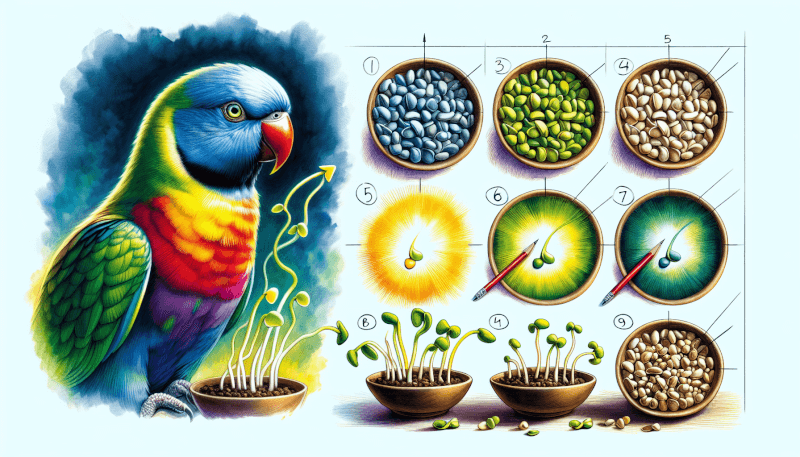
Providing Adequate Moisture
During the sprouting process, your seeds require consistent moisture to facilitate growth. Check the humidity levels regularly and ensure that the seeds and sprouts are neither too dry nor overly saturated. Moisture helps soften the seed coat and enables the sprouts to grow properly.
Ensuring Proper Ventilation
Good airflow is essential to prevent the growth of mold or mildew and aid in the sprouting process. Make sure the sprouting containers or trays have adequate ventilation to allow fresh air to circulate. Avoid sealing the sprouting containers, as this can create a humid environment that promotes mold growth.
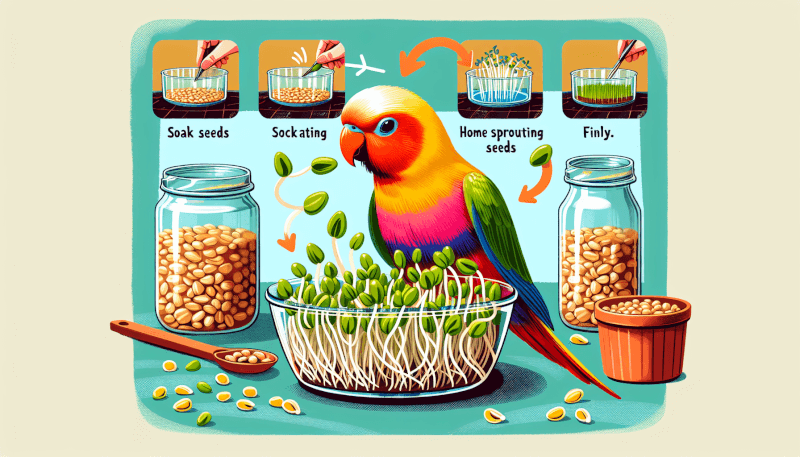
Controlling Temperature
The temperature plays a vital role in the sprouting process. Most seeds sprout best in the temperature range of 65-75°F (18-24°C). Ensure that the sprouting area is not exposed to extreme heat or cold, as it can hinder the sprouting process.
Harvesting and Storing Sprouted Seeds
Once your sprouts have reached the desired length, it’s time to harvest them for your parakeet. Here’s how to do it:
Determining the Sprout Length
Different seed varieties have different recommended sprout lengths. Generally, sprouts are ready for harvest when they have reached 1-2 inches in length. However, refer to specific guidelines for the seed variety you are sprouting to ensure optimal harvest time.
Proper Crop Harvesting Techniques
To harvest your sprouts, gently cut them just above the roots using clean scissors or a sharp knife. Avoid pulling the sprouts forcefully, as this may uproot the entire crop. Once harvested, rinse the sprouts under running water and remove any excess moisture. Let them air dry before serving them to your parakeet.
Safe Storage Practices
To prolong the shelf life of your sprouted seeds, it is essential to store them correctly. Keep the sprouts in a clean, airtight container and store them in the refrigerator. This helps maintain freshness and prevents spoilage. It is important to note that sprouted seeds have a limited shelf life, so regularly check for any signs of spoilage and discard any sprouts that appear slimy or have an unpleasant odor.
Incorporating Sprouted Seeds in a Parakeet’s Diet
Now that you have successfully sprouted your seeds, it’s time to introduce them into your parakeet’s diet. Here are some guidelines to follow:
Gradual Introduction to the Diet
When introducing sprouted seeds to your parakeet’s diet, do so gradually. Start by offering a small portion of sprouts and observe your parakeet’s response. If they show interest and tolerate the new addition well, gradually increase the amount over time. This gradual transition helps your parakeet adjust to the new texture and taste of the sprouted seeds.
Mixing with Other Feed Options
To provide a balanced diet, it is recommended to mix sprouted seeds with other feed options. This can include a mixture of high-quality pellets, fresh fruits, vegetables, and a small amount of high-quality seed mix. By combining different food options, you ensure that your parakeet receives a variety of nutrients necessary for their optimal health.
Monitoring Consumption
While sprouted seeds offer numerous benefits, it’s important to monitor your parakeet’s consumption. Each bird has different dietary needs and preferences, so observe how they respond to the sprouted seeds. If they consume the sprouts eagerly and show improved health, you can continue offering them as part of their regular diet. However, if they show decreased interest or any adverse reactions, consult with a veterinarian to assess the suitability of sprouted seeds for your parakeet.
Potential Risks and Precautions
While sprouted seeds offer various health benefits, it is crucial to be aware of potential risks and take necessary precautions:
Avoiding Contamination
To prevent contamination, ensure that all equipment, containers, and surfaces used for sprouting are thoroughly cleaned and sanitized before use. Always use clean, filtered water for soaking and rinsing the seeds to minimize the risk of bacterial growth.
Preventing Mold Growth
Mold growth can be a concern when sprouting seeds. To prevent mold, ensure proper ventilation, provide adequate air circulation, and avoid over-saturating the seeds. Regularly inspect the sprouting seeds for any signs of mold or fungal growth, and if detected, discard the entire batch to prevent potential health issues for your parakeet.
FAQs about Sprouting Seeds for Parakeets
Can all types of seeds be sprouted for parakeets?
While many seed varieties can be sprouted for parakeets, not all seeds are suitable for sprouting. It is important to choose seeds that are safe and beneficial for your parakeet’s health. Refer to reliable sources or consult with a veterinarian to determine which specific seeds are suitable for sprouting for your parakeet.
How long does the sprouting process usually take?
The sprouting process duration depends on the seed variety and environmental conditions. Generally, most sprouts are ready for harvest within 2-7 days. However, specific seed varieties may have different sprouting times, so it is essential to refer to the recommended guidelines for each seed type.
Can I use store-bought sprouted seeds instead?
Store-bought sprouted seeds can be used as an alternative to home-sprouted seeds. However, it is important to ensure that the store-bought sprouts are fresh, free from contaminants, and come from a reliable source. Read the labels carefully to ensure that no additional additives or preservatives are present. Whenever possible, home-sprouted seeds are recommended as they provide greater control over the sprouting process and allow you to offer the freshest possible sprouts to your parakeet.
Conclusion
By incorporating sprouted seeds into your parakeet’s diet, you can significantly enhance their health and nutrition. The increased nutrient content, improved digestibility, and boosted immune system offered by sprouted seeds make them an excellent addition to your feathered friend’s meals. Just remember to choose the right seeds, follow proper sprouting techniques, and monitor your parakeet’s response. With proper care and attention, your parakeet will thrive on a diet enriched with sprouted seeds, leading to a happier and healthier bird.
